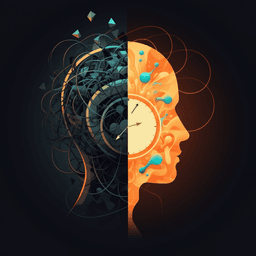
Space Sciences
Effects of total sleep deprivation on performance in a manual spacecraft docking task
S. Piechowski, L. J. Kalkoffen, et al.
This research by Sarah Piechowski and colleagues delves into the impacts of 24 hours of total sleep deprivation on performance in complex tasks such as spacecraft docking and psychomotor vigilance. Discover how sleep loss significantly affects task performance and accuracy, particularly under challenging conditions, and learn about the innovative docking simulation that could shed light on these impairments.
~3 min • Beginner • English
Introduction
The study addresses whether one night (~24 h) of total sleep deprivation impairs performance in a complex, mission-critical operational task—manual spacecraft docking—beyond known effects on basic cognitive tasks. Sleep loss and circadian disruption are common in operational settings and in spaceflight, leading to fatigue-related performance decrements and increased accident risk. Prior evidence shows sleep deprivation degrades sustained attention (e.g., PVT) and cognitive functions relevant to docking (processing speed, visual tracking, working memory), but links to complex operational performance are less clear. Some studies suggest motivation/novelty may enable compensation, showing no decrements in complex simulated space tasks. The authors hypothesized that docking accuracy and progression through increasing difficulty levels would deteriorate after sleep deprivation compared with normal sleep, and examined whether impairment in sustained attention (PVT) explains docking performance under sleep loss.
Literature Review
The paper reviews evidence that insufficient sleep is prevalent in shiftwork and spaceflight; astronauts often average ~6 h sleep leading to chronic sleep deficiency, with environmental and psychological contributors and circadian misalignment. Sleepiness increases risk of human error and accidents in operational domains (healthcare, transportation, aviation). In spaceflight, fatigue has been implicated in incidents (e.g., Progress–Mir collision). Cognitive domains tied to docking performance (processing speed, visual tracking, working memory) are sensitive to sleep loss. The Psychomotor Vigilance Task (PVT) is a sensitive measure of sleep-loss-related deficits in sustained attention, showing slowed responses and more lapses under sleep restriction or deprivation. Prior studies with complex spaceflight simulations during acute sleep deprivation reported mixed results, sometimes showing compensatory neural responses without behavioral impairment, possibly due to small samples or high motivation/novelty effects. There remains a need to clarify how sleep deprivation translates to complex operational performance and the extent to which sustained attention deficits account for such impairments.
Methodology
Design: Randomized, counterbalanced cross-over laboratory study conducted at DLR (2019–2020), with two conditions: control (8 h sleep, 23:00–07:00; testing 13:00–15:00) and total sleep deprivation (~24 h continuous monitored wakefulness; testing 07:00–09:00). Participants stayed 5 days/4 nights; conditions were separated within the stay, order counterbalanced. Light during wake maintained at ~100 lux. Caffeine was prohibited for one week prior and during the study. Ethics approval obtained; DRKS00017789; informed consent collected.
Participants: 66 enrolled; 4 excluded (attendance issues, technical problems); final N=62 (28 women, 34 men), age 18–39 (M=24.84, SD=4.69). Mostly students. Screening included medical exam and questionnaires: STOP-Bang, Epworth Sleepiness Scale, Freiburger Persönlichkeitsinventar, Beck Depression Inventory. Exclusion: pregnancy, smoking, drug use, relevant medication, BMI>30 kg/m².
Docking simulation (6df): Computer-based platform (SpaceBit GmbH; controls by Koralewski Industrie-Elektronik) modeling manual docking with six degrees of freedom, based on TORU/Soyuz dynamics but generic, not a Soyuz replica. Left control: translation (up/down, left/right, forward/backward); right control: rotation (roll, pitch, yaw). Shortened adaptive version used: 11 task designs across 5 difficulty levels. Level 1: single DoF translation; Level 2: two DoF translation; Level 3: orientation and stabilization at safety distance (both controls); Level 4: stabilization plus approach and docking contact; Level 5: full standard docking with curved flight-around, stabilization, approach, docking. No prior training; participants received written instructions and an instructional film at each session; specific trial instructions preceded each trial. Feedback per TORU methodology after each trial, including parameters and aggregated accuracy score (0 worst to 1 best). Each session began with a level 4 trial (no flight-around). Adaptive progression: accuracy<0.85 → easier next trial; 0.85–<0.95 → repeat same level; ≥0.95 → advance to harder level. Each trial lasted up to ~10 minutes (excluding instruction/feedback). Session time-capped at 35 minutes; number and levels completed varied per participant. A total of 856 trials were attempted; 56 discontinued because distance>200 m were excluded, leaving 800 valid trials.
Psychomotor Vigilance Task (PVT): 10-minute PVT implemented in Matlab with Psychtoolbox on Windows; responses via Arduino-based response box. Task: respond to a millisecond counter with dominant-hand thumb. Inter-stimulus interval 2–10 s. Valid responses >130 ms; lapses defined as RT>500 ms. Calibration showed <1 ms SD and ~9 ms bias (stimulus buildup). Outcomes: mean response speed (1/RT) and number of lapses.
Subjective sleepiness: Karolinska Sleepiness Scale (KSS; 1–9) at session start.
Statistical analysis: Data preprocessing in SPSS 26; analyses in R 4.0.2. Significance alpha=0.05, two-sided. Normality checked via Q–Q plots/histograms. Linear mixed models (LMMs) used for KSS, PVT outcomes, and docking accuracy. For the docking LMM: accuracy (inverse log transformed) as dependent variable; random intercept for participant; fixed effects: 6df difficulty level (levels 1–2 merged; levels 4–5 merged due to similarity and sample sizes), session (first vs second), condition (control vs sleep deprivation), age, gender. Post hoc contrasts with emmeans; p-values FDR-adjusted (Benjamini–Hochberg). Effect sizes: marginal/conditional pseudo-R² via MuMIn; nonparametric r=Z/√N where applicable. Susceptibility to sleep loss assessed as within-subject PVT change (sleep deprivation minus control): response speed difference (negative indicates slowing) and lapse difference (positive indicates more lapses). Extended models added susceptibility and its interaction with condition. Level progression analyzed via Wilcoxon signed-rank test comparing highest successfully completed level (accuracy≥0.85) between conditions and between sessions.
Key Findings
Manipulation check and PVT: Participants were significantly sleepier after sleep deprivation (KSS: M=7.52, SD=1.54) than control (M=3.53, SD=1.61), F(1,61)=223.15, p<0.001, R²m=0.62, R²c=0.66. PVT response speed decreased after sleep deprivation (M=3.36 vs 3.89), F(1,61)=103.85, p<0.001, R²m=0.19, R²c=0.78; lapses increased (M=9.40 vs 1.76), F(1,61)=95.93, p<0.001, R²m=0.30, R²c=0.61.
Docking accuracy: On average, participants completed 6.32 trials (4.38 min/trial) in control and 6.58 trials (4.26 min/trial) in sleep deprivation. Overall mean accuracy across trials was 0.76 (SD=0.33). LMM showed main effects of level, F(2,776.68)=349.15, p<0.001, and session, F(1,746.50)=81.62, p<0.001, with interaction level×session, F(2,736.32)=4.97, p=0.007. Critically, condition had a significant main effect, F(1,747.76)=9.15, p=0.003: accuracy was lower after sleep deprivation (M=0.74, SD=0.35) vs control (M=0.78, SD=0.32). No condition×session interaction, F(1,52.99)=2.60, p=0.11. Condition×level interaction was significant, F(2,736.17)=3.94, p=0.02. Post hoc contrasts: no condition effect at levels 1–2 (t(739)=-1.79, p=0.11) or level 3 (t(764)=0.12, p=0.91); accuracy decreased at levels 4–5 under sleep deprivation (t(745)=-3.63, p<0.001). Men had higher accuracy than women, F(1,49.37)=11.97, p=0.001; accuracy decreased with age, F(1,49.65)=8.95, p=0.004. Model variance explained: R²c≈0.65, R²m≈0.46.
Relation to sustained attention: Adding PVT susceptibility (response speed difference SDC–CC) removed the main effect of condition, F(1,729.04)=0.06, p=0.81, but condition×level remained, F(2,735.32)=3.52, p=0.03. Condition×susceptibility was significant, F(1,726.00)=6.33, p=0.01: greater slowing on PVT under sleep loss predicted larger decrements in docking accuracy. Using lapse difference similarly removed the main condition effect, F(1,732.41)=1.47, p=0.23; condition×level persisted, F(2,734.83)=3.60, p=0.03; condition×susceptibility (lapses) was not significant, F(1,726.53)=3.43, p=0.06.
Level progression: Distribution of valid trials: 3.25% level 1, 14.25% level 2, 43.88% level 3, 28.75% level 4, 9.87% level 5. Highest achieved level improved from session 1 to 2 (M=2.95 to 3.84), V=13.50, p<0.001, r=0.76. No significant difference between conditions (control M=3.50 vs sleep deprivation M=3.29), V=531.50, p=0.18.
Discussion
The study demonstrates that a single night of total sleep deprivation impairs performance in a complex, operationally relevant manual spacecraft docking task, particularly at higher difficulty levels that approximate full docking maneuvers. Participants appeared able to compensate at lower task demands (levels 1–3), likely due to the task’s novelty and motivational appeal and the allowance of sufficient time, aligning with theories that motivation and effort can mitigate sleep-loss effects on complex tasks more than on monotonous ones. Sustained attention deficits measured by the PVT were substantial under sleep deprivation and partially accounted for docking impairments: the main condition effect vanished when PVT susceptibility was included, and individuals with greater PVT response slowing showed larger docking accuracy decrements. However, sustained attention did not fully explain performance, indicating additional cognitive-motor components contribute to operational decrements. Learning effects were evident across sessions and occurred even under sleep deprivation, and demographic factors (age, gender) influenced accuracy, potentially reflecting differences in prior joystick/gaming experience or learning speed. Compared with previous small-sample studies that did not detect impairments in complex space-relevant tasks after sleep loss, the present larger, controlled cross-over design revealed decrements specifically at higher task demands, underscoring safety implications for mission-critical operations.
Conclusion
A counterbalanced cross-over study with 62 participants showed that ~24 h of total sleep deprivation impairs accuracy in a complex manual spacecraft docking simulation, with effects emerging at the highest difficulty levels. Declines in sustained attention (PVT) partly explained docking performance decrements, and individuals more vulnerable on the PVT exhibited larger operational impairments. While participants could compensate at lower task demands, even small accuracy decrements in safety-critical contexts are concerning. Operational performance measures like the 6df docking task may aid in readiness-for-duty assessment during long-duration missions, and brief sustained attention tests (PVT) can serve as early indicators of potential decrements. Future research should examine the impact of extensive training on susceptibility to sleep loss, the effects of chronic and partial sleep restriction and circadian misalignment, and refine operational task assessments for in-mission monitoring.
Limitations
- Adaptive task design yielded variable numbers and difficulty of trials per participant, complicating direct comparisons, though it enabled appropriate challenge without prior training.
- Lack of prior training increased between-subject variance and may have masked some effects; novice student sample limits generalizability to astronauts.
- Order/learning effects were present across sessions; although a counterbalanced cross-over minimized confounding and no condition×session interaction was found, learning could still influence outcomes.
- Testing times differed between conditions (circadian phase confound: control early afternoon vs sleep deprivation early morning); forced desynchrony literature suggests limited effects in this phase range, but some contribution cannot be excluded.
- Findings may not generalize to chronic or partial sleep restriction common in operational settings; motivational effects may differ over prolonged missions.
- One subset of author affiliations (a fifth affiliation marker) was not specified in the provided text, but does not affect study results.
Related Publications
Explore these studies to deepen your understanding of the subject.







